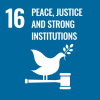
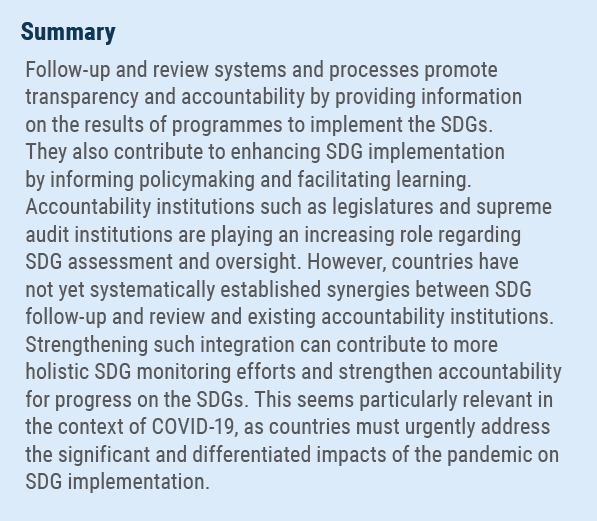 The 2030 Agenda highlights the importance of the follow-up and review of the Sustainable Development Goals (SDGs) as an accountability mechanism and sets clear principles to guide it. Accountability institutions such as parliaments and supreme audit institutions (SAIs) are playing an increasing role in SDG oversight and assessment. However, while countries have made significant progress in institutionalizing SDG follow-up and review, the performance of such systems and processes is limited due to their imperfect integration with existing monitoring and evaluation systems and accountability institutions. The disconnect with accountability institutions is particularly relevant in the context of COVID-19. As countries must urgently address the social and economic impacts of the pandemic on SDG implementation and particularly on the most vulnerable, there is a need for increased oversight and independent assessments of those impacts in order to inform policymaking and support the longer-term recovery efforts. This brief discusses the critical importance of connecting SDG follow-up and review systems with accountability institutions. It reviews the available evidence on these connections and highlights some good practices. The brief presents some recommendations for maximizing these synergies going forward, taking into consideration the impact of COVID-19 on SDG implementation.
The 2030 Agenda highlights the importance of the follow-up and review of the Sustainable Development Goals (SDGs) as an accountability mechanism and sets clear principles to guide it. Accountability institutions such as parliaments and supreme audit institutions (SAIs) are playing an increasing role in SDG oversight and assessment. However, while countries have made significant progress in institutionalizing SDG follow-up and review, the performance of such systems and processes is limited due to their imperfect integration with existing monitoring and evaluation systems and accountability institutions. The disconnect with accountability institutions is particularly relevant in the context of COVID-19. As countries must urgently address the social and economic impacts of the pandemic on SDG implementation and particularly on the most vulnerable, there is a need for increased oversight and independent assessments of those impacts in order to inform policymaking and support the longer-term recovery efforts. This brief discusses the critical importance of connecting SDG follow-up and review systems with accountability institutions. It reviews the available evidence on these connections and highlights some good practices. The brief presents some recommendations for maximizing these synergies going forward, taking into consideration the impact of COVID-19 on SDG implementation.
Integration with accountability systems is crucial for effective SDG follow-up and review
The 2030 Agenda promotes “a robust, voluntary, effective, participatory, transparent and integrated follow-up and review framework [that] will make a vital contribution to implementation and will help countries to maximize and track progress [...] to ensure that no one is left behind.” Beyond measuring progress towards targets, the Agenda emphasizes ongoing mutual learning and recognizes the contribution of multiple stakeholders, as it encourages countries to conduct “regular and inclusive reviews of progress at the national and sub-national levels”, which draw on “contributions from indigenous peoples, civil society, the private sector and other stakeholders, in line with national circumstances, policies and priorities. National parliaments as well as other institutions can also support these processes.” In 2021, the review of the implementation of the General Assembly resolution on the follow-up and review of the 2030 Agenda reaffirmed the essential role of national parliaments “through their enactment of legislation and adoption of budgets and their role in ensuring implementation and accountability at the national level for the effective implementation of the 2030 Agenda and the Sustainable Development Goals.” National efforts to institutionalize SDG follow-up and review systems and processes have paid off. Most countries have identified the institutions responsible for SDG follow-up, review and reporting, and defined their responsibilities. They have assessed the availability of national indicators to measure progress and are working on improving data availability and quality. Countries have also improved their voluntary national review (VNR) reports, with positive spillovers at subnational and local levels, and are increasingly leveraging information and communication technologies (ICTs) to better communicate and report on the SDGs. Despite this progress, significant challenges remain. There are data gaps and constraints related to data disaggregation and quality, coordination of data producers, and local capacity to collect and analyze data. Global and national reporting do not yet form an ongoing continuous cycle. Ideally countries will integrate SDG follow-up and review into their national and sectoral monitoring and evaluation systems to avoid having parallel systems. However, this integration has faced challenges (see box below on monitoring progress on food security in Chile and Costa Rica) . The use of information from SDG follow-up and review to inform policymaking is also limited. Another critical limitation of SDG follow-up and review at the national level has been the lack of articulation with the institutional oversight system—including parliaments and SAIs—to ensure accountability for SDG implementation efforts. In practice, SDG oversight by accountability institutions and follow-up and review processes have not yet been mutually supportive. 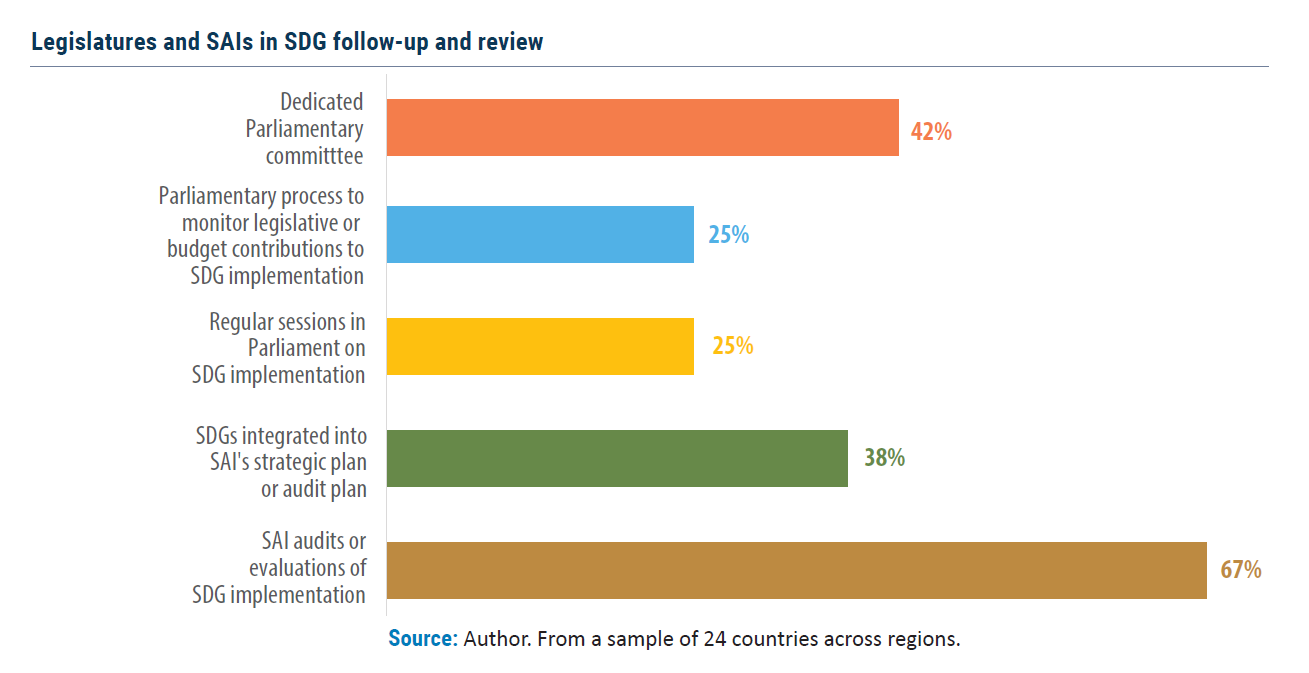 There is a need to strengthen the independent assessment of SDG implementation efforts. Most information available on SDG implementation is self-reported by governments. Independent assessments are therefore critical to bring a different perspective and to triangulate self-reported information. Moreover, there is a need to increase oversight and scrutiny of SDG implementation actions to ensure that public resources, policies and programmes produce the intended results and to correct course when progress is insufficient and actions ineffective. The integration of SDG follow-up and review with accountability systems would also support a more holistic and complete understanding of SDG implementation. Both parliaments and SAIs play a relevant role in SDG assessment and oversight (see figure above), which has also increased over time. They are producing relevant information on SDG implementation. While parliaments’ involvement is more uneven across countries, SAIs have decisively engaged in SDG oversight through multiple initiatives. Information produced by both parliaments and SAIs has gained relevance as a critical input to monitor and strengthen SDG implementation. However, countries do not seem to be effectively tapping on this wealth of information yet.
There is a need to strengthen the independent assessment of SDG implementation efforts. Most information available on SDG implementation is self-reported by governments. Independent assessments are therefore critical to bring a different perspective and to triangulate self-reported information. Moreover, there is a need to increase oversight and scrutiny of SDG implementation actions to ensure that public resources, policies and programmes produce the intended results and to correct course when progress is insufficient and actions ineffective. The integration of SDG follow-up and review with accountability systems would also support a more holistic and complete understanding of SDG implementation. Both parliaments and SAIs play a relevant role in SDG assessment and oversight (see figure above), which has also increased over time. They are producing relevant information on SDG implementation. While parliaments’ involvement is more uneven across countries, SAIs have decisively engaged in SDG oversight through multiple initiatives. Information produced by both parliaments and SAIs has gained relevance as a critical input to monitor and strengthen SDG implementation. However, countries do not seem to be effectively tapping on this wealth of information yet.
Connecting the dots with parliaments: Legislative oversight and SDG follow-up and review
Parliaments have increasingly been included in the SDG institutional framework (e.g. Costa Rica). Many parliaments have established formal mechanisms for SDG legislative oversight, including dedicated oversight committees or sub-committees; mainstreaming SDGs into existing committees, or adopting a decentralized model, such as identifying SDG focal points or creating networks. For example, parliaments in countries such as Costa Rica, Finland, Italy, Kenya, Mongolia, Nepal, the Philippines, Republic of Korea, Sierra Leone and Spain have a dedicated legislative committee on SDGs. Others, like the parliament of Georgia, have approved SDG monitoring strategies. Parliaments are conducting assessments on SDG implementation. The Environmental Audit Committee of the UK House of Commons published SDGs in the UK follow-up: Hunger, malnutrition and food insecurity in the UK in 2019, which highlights conclusions in consonance with work by UK Stakeholders for Sustainable Development. The Legislative Assembly of Costa Rica has developed a methodology to assess progress towards the SDGs and reported the intention to create an online tool for these purposes. It also conducts legal, economic, and social studies of draft legislation to analyze their links to the SDGs. 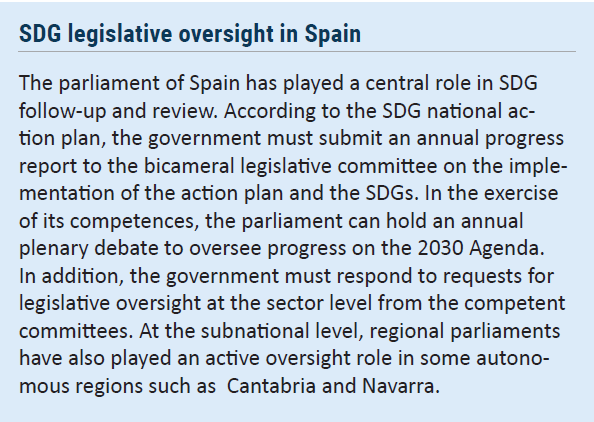 Parliaments have also engaged in extra-parliamentary activities that contribute to SDG follow-up and review, including participation in national delegations to the High-level Political Forum (HLPF) (e.g. Peru); providing inputs to VNR reports (e.g. Bangladesh, Bhutan, Indonesia); and cooperation with civil society for SDG oversight (e.g. Sierra Leone). Globally, 25 per cent of 153 recently surveyed UN Member States have engaged in some form of extra-parliamentary involvement. However, the limited articulation of SDG follow-up and review with accountability systems is evident in the limited provision of regular SDG implementation reports to parliament. According to data from the Inter-Parliamentary Union (IPU), only 51 per cent of 89 countries that responded to a recent survey indicated that governments had submitted reports. Some governments report on the SDGs as a whole, while others report on specific SDGs. The few countries with regular SDG reporting to parliament include Denmark, Finland, France, the Kingdom of the Netherlands, Spain and the United Arab Emirates. In France, for example, the 2019 SDG Roadmap foresees an annual progress report to parliament. Finland is the only country that has established a regular SDG monitoring and reporting cycle that integrates government-led monitoring with legislative oversight, external auditing and independent evaluation as well as regular engagement of non-state stakeholders in the reporting process. Germany illustrates another good practice of systematic monitoring and accountability. The German sustainable development strategy, which was aligned to the SDGs in 2017, is independently monitored by the Federal Statistical Office through a set of indicators. The German SAI has reviewed the sustainable development strategy and conducts audits on the performance of government programmes on sustainable development. A parliamentary advisory council at the German parliament exercises oversight over the implementation of the sustainable development strategy and addresses emerging sustainable development issues through hearings and discussion papers.
Parliaments have also engaged in extra-parliamentary activities that contribute to SDG follow-up and review, including participation in national delegations to the High-level Political Forum (HLPF) (e.g. Peru); providing inputs to VNR reports (e.g. Bangladesh, Bhutan, Indonesia); and cooperation with civil society for SDG oversight (e.g. Sierra Leone). Globally, 25 per cent of 153 recently surveyed UN Member States have engaged in some form of extra-parliamentary involvement. However, the limited articulation of SDG follow-up and review with accountability systems is evident in the limited provision of regular SDG implementation reports to parliament. According to data from the Inter-Parliamentary Union (IPU), only 51 per cent of 89 countries that responded to a recent survey indicated that governments had submitted reports. Some governments report on the SDGs as a whole, while others report on specific SDGs. The few countries with regular SDG reporting to parliament include Denmark, Finland, France, the Kingdom of the Netherlands, Spain and the United Arab Emirates. In France, for example, the 2019 SDG Roadmap foresees an annual progress report to parliament. Finland is the only country that has established a regular SDG monitoring and reporting cycle that integrates government-led monitoring with legislative oversight, external auditing and independent evaluation as well as regular engagement of non-state stakeholders in the reporting process. Germany illustrates another good practice of systematic monitoring and accountability. The German sustainable development strategy, which was aligned to the SDGs in 2017, is independently monitored by the Federal Statistical Office through a set of indicators. The German SAI has reviewed the sustainable development strategy and conducts audits on the performance of government programmes on sustainable development. A parliamentary advisory council at the German parliament exercises oversight over the implementation of the sustainable development strategy and addresses emerging sustainable development issues through hearings and discussion papers. 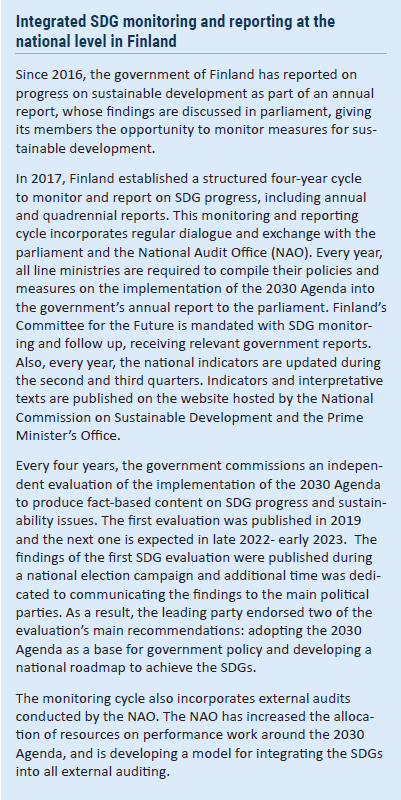 There are few documented examples of changes in SDG implementation in response to legislative inputs or requests. In 2016, the regional parliament of Navarra (Spain) requested the regional government to prepare a report on the actions undertaken to implement the 2030 Agenda. The government created an intersectoral commission to respond to the legislative request and prepare the report. Independent assessments have emphasized the need to improve reporting to parliament. In 2019, Finland’s National Audit Office noted that the government’s reports to parliament are not structured like the report on sustainable development (on which the SAI issues an opinion), making it difficult to monitor implementation. In 2020, the Belgian Court of Audit highlighted the need to monitor strategic plans and measures for SDG implementation to ensure regular reporting to parliament.
There are few documented examples of changes in SDG implementation in response to legislative inputs or requests. In 2016, the regional parliament of Navarra (Spain) requested the regional government to prepare a report on the actions undertaken to implement the 2030 Agenda. The government created an intersectoral commission to respond to the legislative request and prepare the report. Independent assessments have emphasized the need to improve reporting to parliament. In 2019, Finland’s National Audit Office noted that the government’s reports to parliament are not structured like the report on sustainable development (on which the SAI issues an opinion), making it difficult to monitor implementation. In 2020, the Belgian Court of Audit highlighted the need to monitor strategic plans and measures for SDG implementation to ensure regular reporting to parliament.
Connecting the dots with SAIs: Auditing the SDGs and contributing to follow-up and review
Greater synergies exist between national follow-up and review processes and external audits. This can be attributed in part to SAIs’ strong and formalized commitment to contribute to SDG follow-up and review. In most countries, SAIs have not been formally integrated into the SDG institutional structure and follow-up and review cycle. One notable exception is Finland. However, SAIs’ commitment has translated into innumerable initiatives to independently assess SDG implementation, including the follow-up and review systems. The International Organization of SAIs (INTOSAI) reported approximately 73 initiatives as of December 2020. SAIs have conducted audits to assess the governments’ preparedness to implement the SDGs, focusing on the center of government as well as selected Goals or targets (e.g. target 2.4 on ensuring sustainable food production systems and implementing resilient agricultural practices, SDG5 on gender equality). SAIs are currently auditing the implementation of programmes to advance specific SDG targets. For example, Brazil’s Federal Court of Accounts has coordinated an audit (with SAIs from Latin America, Spain and Portugal) on the implementation of selected targets of SDGs 14 and 15 with a focus on terrestrial and marine protected areas. The Office of the Auditor General of the Seychelles carried out a special review on coastal management in line with SDG 14. Costa Rica’s SAI has conducted audits on water service delivery (SDG6) for vulnerable populations, SDG 7 with a focus on renewable energy, and is leading a coordinated audit on target 12.7 on sustainable public procurement. 40 SAIs are conducting an audit of resilient national public health systems, linked to target 3.d. 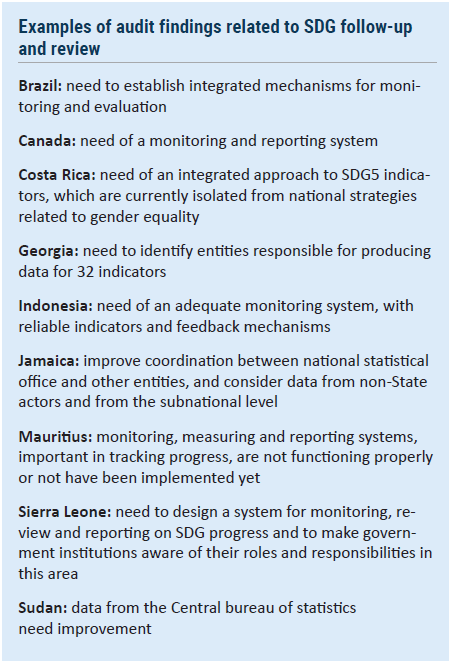 SAIs have also contributed to the VNR process. Around 30 per cent of the 47 countries which conducted a VNR in 2020 reported on engaging SAIs in preparing the VNR or implementing SDGs. This represents an increase compared to 2019, when SAI engagement was below 15 per cent. In addition to providing inputs to VNR reports, SAIs have participated in consultations (e.g. Bangladesh), joined national delegations to the HLPF (e.g. Brazil, Indonesia), and validated draft VNR reports based on audit findings (e.g. Palestine). Contributions to VNR reports are diverse. In Chile, the 2019 VNR included an annex summarizing initiatives and contributions of the general comptroller. Costa Rica’s 2020 VNR included information on how the government had addressed the recommendations of the audits conducted by the SAI. SAIs also reported on their initiatives in the 2019 VNR of Indonesia and the 2020 VNRs of Argentina and Samoa. All these efforts have produced relevant information, including on critical dimensions of SDG follow-up and review such as the integration within existing monitoring systems. SAIs have engaged with governments based on audit information, and audit recommendations have also been leveraged by other stakeholders to improve SDG implementation. Several SAIs have engaged with ministries of planning and SDG steering bodies to discuss the results of the audits (e.g. Botswana, the Philippines). SAI Guatemala signed an agreement with the department of planning to monitor alignment of the national development plan with the SDGs. Moreover, audits have triggered changes in SDG implementation. SAIs have reported that audit recommendations have been accepted by governments in countries such as Botswana, Chile, Colombia, Costa Rica, Georgia, Ghana, Malaysia, Slovakia, Spain, the Philippines, and Tonga. In Chile, the audit on government preparedness to implement SDG5 led several institutions to approve gender policies and improve internal procedures. In Costa Rica, all but one of the audit recommendations had been implemented as of July 2020, and a study on gender equality had been conducted. The government reported that actions to implement the recommendations of other SDG audits were also under consideration. In response to one of the audit recommendations, the government of Spain changed the composition of the highest coordinating body on SDGs to avoid overlapping functions and enhance the representation of subnational governments and non-State actors.
SAIs have also contributed to the VNR process. Around 30 per cent of the 47 countries which conducted a VNR in 2020 reported on engaging SAIs in preparing the VNR or implementing SDGs. This represents an increase compared to 2019, when SAI engagement was below 15 per cent. In addition to providing inputs to VNR reports, SAIs have participated in consultations (e.g. Bangladesh), joined national delegations to the HLPF (e.g. Brazil, Indonesia), and validated draft VNR reports based on audit findings (e.g. Palestine). Contributions to VNR reports are diverse. In Chile, the 2019 VNR included an annex summarizing initiatives and contributions of the general comptroller. Costa Rica’s 2020 VNR included information on how the government had addressed the recommendations of the audits conducted by the SAI. SAIs also reported on their initiatives in the 2019 VNR of Indonesia and the 2020 VNRs of Argentina and Samoa. All these efforts have produced relevant information, including on critical dimensions of SDG follow-up and review such as the integration within existing monitoring systems. SAIs have engaged with governments based on audit information, and audit recommendations have also been leveraged by other stakeholders to improve SDG implementation. Several SAIs have engaged with ministries of planning and SDG steering bodies to discuss the results of the audits (e.g. Botswana, the Philippines). SAI Guatemala signed an agreement with the department of planning to monitor alignment of the national development plan with the SDGs. Moreover, audits have triggered changes in SDG implementation. SAIs have reported that audit recommendations have been accepted by governments in countries such as Botswana, Chile, Colombia, Costa Rica, Georgia, Ghana, Malaysia, Slovakia, Spain, the Philippines, and Tonga. In Chile, the audit on government preparedness to implement SDG5 led several institutions to approve gender policies and improve internal procedures. In Costa Rica, all but one of the audit recommendations had been implemented as of July 2020, and a study on gender equality had been conducted. The government reported that actions to implement the recommendations of other SDG audits were also under consideration. In response to one of the audit recommendations, the government of Spain changed the composition of the highest coordinating body on SDGs to avoid overlapping functions and enhance the representation of subnational governments and non-State actors.
Connecting all the dots
Governments can adjust the implementation of the SDGs based on evaluations, external audits, legislative oversight, and inputs from civil society, among other sources. The timing of the inputs is critical to inform decision-making. Ensuring that audit reports and recommendations are communicated in a timely manner to the legislature and relevant stakeholders is important to strengthen accountability. The SAIs of Bhutan, Georgia and Slovakia disseminated the conclusions of the SDG preparedness audits through the media, and civil society welcomed the results of the audit in Uruguay. 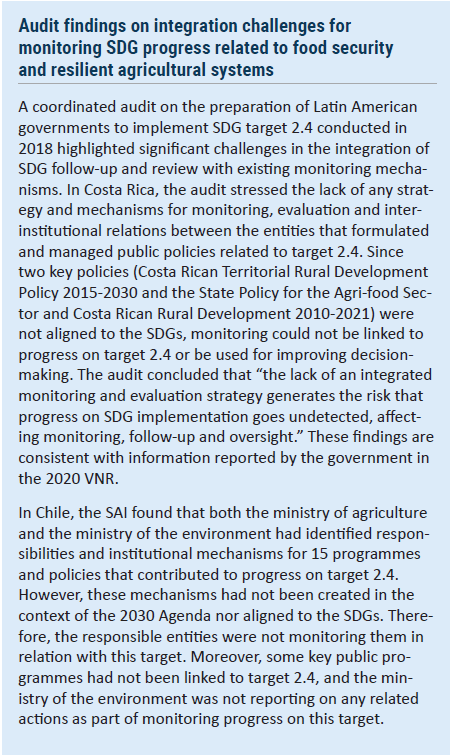 Parliaments receive reports from a variety of sources in addition to government, including SAIs. The engagement of SAIs with parliaments to strengthen SDG oversight is subject to the same challenges that affect engagement around all audit reports. As reported by the IPU in 2017, only 66 out of 100 parliaments surveyed had procedures in place to review audit reports. There are, however, some good practices. In 2017, the Netherlands’ parliament received information from both the executive and the court of audit on SDG implementation. The court informed the house of representatives of the results of a review of the preparation to implement the SDGs. The report of the court of audit contributed to strengthening collaboration with legislators on the SDGs.
Parliaments receive reports from a variety of sources in addition to government, including SAIs. The engagement of SAIs with parliaments to strengthen SDG oversight is subject to the same challenges that affect engagement around all audit reports. As reported by the IPU in 2017, only 66 out of 100 parliaments surveyed had procedures in place to review audit reports. There are, however, some good practices. In 2017, the Netherlands’ parliament received information from both the executive and the court of audit on SDG implementation. The court informed the house of representatives of the results of a review of the preparation to implement the SDGs. The report of the court of audit contributed to strengthening collaboration with legislators on the SDGs.
Opportunities for more integrated SDG follow-up and review systems
There is recognition of the importance of accountability for SDG implementation efforts. Follow-up and review systems and processes have expanded, institutionalized and improved. Progress is evident in the development of national indicator frameworks, the adherence to the VNR process and more routine reporting, among other areas. However, SDG follow-up and review has not been sufficiently integrated with existing accountability systems. Accountability institutions such as legislatures and SAIs are crucial for supporting SDG monitoring, follow-up and review. SAIs can provide relevant information on the performance of programmes to implement the SDGs and on the institutional systems to support SDG implementation. Drawing on this and other inputs, parliaments exercise a critical oversight function to hold governments accountable for the results of SDG implementation and progress towards the targets. There are opportunities for enhancing integration. First, countries should establish continuous and periodic cycles of SDG monitoring and reporting, with clear milestones and timelines. Second, countries should assign roles and responsibilities for SDG monitoring and reporting, considering the role and contributions of legislatures and SAIs. Third, they should set well-defined processes to support SDG monitoring and reporting, including the submission of regular reports to parliament and the timely receipt of regular reports from SAIs. Without undermining their oversight function, SAIs can play a critical advisory role to governments to improve the implementation of the SDGs. This advisory role should be strengthened. Fourth, there should be a systematic approach to promoting the use of information from monitoring and reporting systems, including information produced by legislatures and SAIs, to adjust and improve SDG implementation. This should consider the timing of different processes to enhance their alignment and to ensure that the information produced by different entities can inform policymaking and monitoring processes. Monitoring and reporting processes by different entities should be mutually reinforcing. Finally, governments should also engage non-State stakeholders to complement self-reported information and provide an independent assessment of government actions in order to inform SDG monitoring and reporting processes.
 Welcome to the United Nations
Welcome to the United Nations
